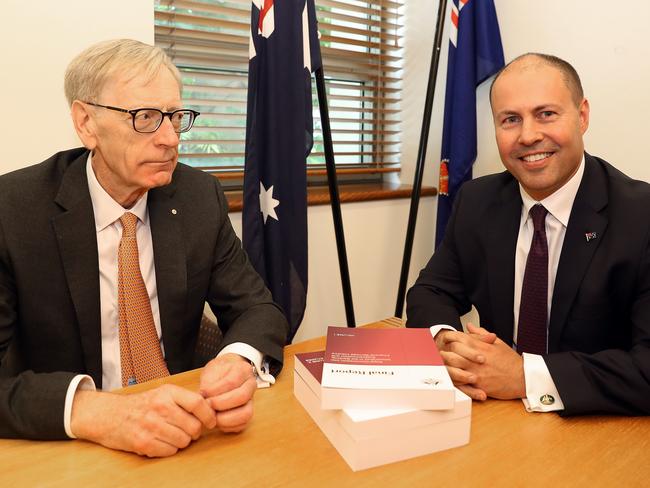Kenneth Hayne’s final banking royal commission report gives the government a headache
Kenneth Hayne’s banking royal commission final report gives the government a headache about how to prevent us needing to go through all this again in a few years’ time, writes James Campbell.
News
Don't miss out on the headlines from News . Followed categories will be added to My News.
Forget the specifics, the main thrust of Kenneth Hayne’s final bankinng royal commission report is, “it’s the vibe of thing”.
Yes, in many cases the conduct revealed in the report has broken the law, but the wider accusation against the country’s financial system is that more often than not the men and women who work in it have fallen short of community expectations.
Endorsing Treasury’s response to his interim report, Hayne says the issue facing government and regulators is how the law can be simplified so that its intent is met, rather than merely its terms complied with.
BANKING ROYAL COMMISSION: THE FINDINGS
FIVE-MINUTE GUIDE TO THE ROYAL COMMISSION FINDINGS
BAREFOOT INVESTOR: GREED ISN’T GOING AWAY
The underlying principles upon which the financial system should operate seem obvious: obey the law; do not mislead or deceive, act fairly; provide fit-for-purpose service with reasonable care and skill; when acting for another, act in the best interests of that other.
But while Hayne argues the law prescribes this behaviour, it does so in a piecemeal fashion, and in some cases, breaches carry no penalty as they are simply licence obligations.
His recommendation is that industry codes of conduct should be incorporated into the law and breaking them should be illegal.

The Commissioner’s other big finding is that “almost every case” the misconduct unearthed was driven “not only by the relevant entity’s pursuit of profit but also by individuals’ pursuit of gain.”
A real shock finding I think we can all agree. His solution is to remove the conflicts that have incentivised wrongdoing.
To that end he recommends trail and “grandfathered” commissions should be banned and mortgage brokers should be paid by the borrower rather than the institution they end up borrowing from.
The Morrison Government has rejected this last one on the grounds it will weaken competition.

A cynic might suspect that with an election fewer than four months away, it can’t afford a fight with the 27,000 people employed in the industry.
Whether Labor wants to make a big noise about it will be interesting to see. In the lead-up to its release, Shadow Treasurer Chris Bowen said Labor’s default position would be to implement every recommendation.
Hayne has now endorsed the Productivity Commission’s recommendation that workers be put into superannuation fund when they join the workforce, which should follow them from job to job.
He hasn’t quite endorsed the PC’s best-in-show model but he’s gone pretty close, putting pressure on Labor to walk away from its opposition.
While many of the recommendations will be implemented immediately, he also recommends that the effectiveness of his remedies should be reviewed in three years’ time.
Let’s hope they work. It would be depressing to have to go through this exercise again.



